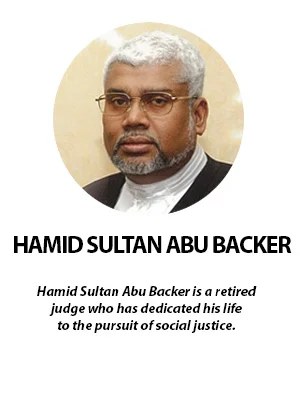
Imprisonment is often not the best form of punishment. For non-violent crimes there are many civilised alternatives to it, including the confiscation of assets, which would be more beneficial to the public purse.
In fact, the imprisonment of a person may destroy the fabric of his family and even see a family member turn to vice in the absence of its breadwinner, ultimately affecting the social culture and economic wellbeing of the country.
In the case of politicians, especially party officials and those with extensive grassroot support, it may also trigger security concerns and economic instability which the rulers ought to consider from a broad prospective.
In Malaysia, the rulers have been given absolute power both in civil and shariah matters to suspend or remit a sentence. This power is not unique to us. The laws of some of the major religions also recognise compensation as an alternative punishment in certain instances.
Regrettably, our legislature has for certain offences taken the regressive step of removing from judges the sentencing discretion given to them under the Criminal Procedure Code (CPC).
On the commercial front, breaches of certain statutory provisions can lead to company directors being imprisoned.
When writing my book on company law recently, I was astonished to discover the minefield of corporation obligation breaches which carry more severe imprisonment terms than I remember from my early days in legal practice.
In my view, strict imprisonment terms may not attract investors to bring in their funds, or robust candidates to sit as directors on the boards of companies. Instead, they may encourage shareholders to appoint unqualified persons – perhaps their drivers and gardeners – to act as their nominees.
To attract foreign investment, the legislature must find suitable substitute punishments for non-violent crimes and statutory commercial breaches.
Presently, our criminal and commercial laws appear more akin to those you would expect to find in a police state.
For example, to establish certain elements of offences, our legislature has over the years imposed various presumptions as to the conduct of certain accused persons, leaving the prosecution with no obligation to prove a case beyond reasonable doubt in its true legal sense.
Such presumptions are legal fiction and not rules recognised by major religions, our constitutional framework or the oaths of office of members of the executive.
The reality is many have been convicted, and some even sentenced to death, on the premise of these presumptions. In fact, it took well over sixty years of nationhood before the mandatory death sentence for certain offences was abolished.
As a judge, I was most uncomfortable hanging or imprisoning persons on the back of such presumptions. In fact, in Public Prosecutor v. Aluma Mark Chononso (2020), I set out the jurisprudence which debunks such presumptions of law of and the death penalty.
It is heartening for me to note that the legislature has acted to remove the mandatory death penalty, a punishment I believe judges were already entitled to circumvent under the constitutional supremacy doctrine, as I explained in the Chonoso case, something they omitted to do.
Under Section 300 of the CPC, a ruler may suspend the execution of any sentence or remit the punishment meted out either in whole or in part. A similar provision exists under Section 132 of the Syariah Criminal Procedure (Federal Territories) Act 1997.
However, to date, I have not heard of anyone petitioning the rulers under this provision of law.
It is time our legal eagles and human rights related groups consider invoking Section 300 to petition the rulers in deserving cases, especially those that involve non-violent offences.
It is also my view that if a person has been imprisoned and has exhausted all appeal procedures, an application for habeas corpus can be moved if it can be shown that a patent miscarriage of justice has occurred or the procedure which led to the person’s imprisonment was unconstitutional.
I say this on the ground that judges, including judicial commissioners, are all of the same category in status, even if their jurisdiction to hear cases differs.
(Habeas corpus is a prerogative writ recognised in common law to release a person from captivity if the authority who had detained the person acted unconstitutionally. The power is usually exercised by the High Court in the first instance.) - FMT
The views expressed are those of the writer and do not necessarily reflect those of MMKtT.



No comments:
Post a Comment
Note: Only a member of this blog may post a comment.